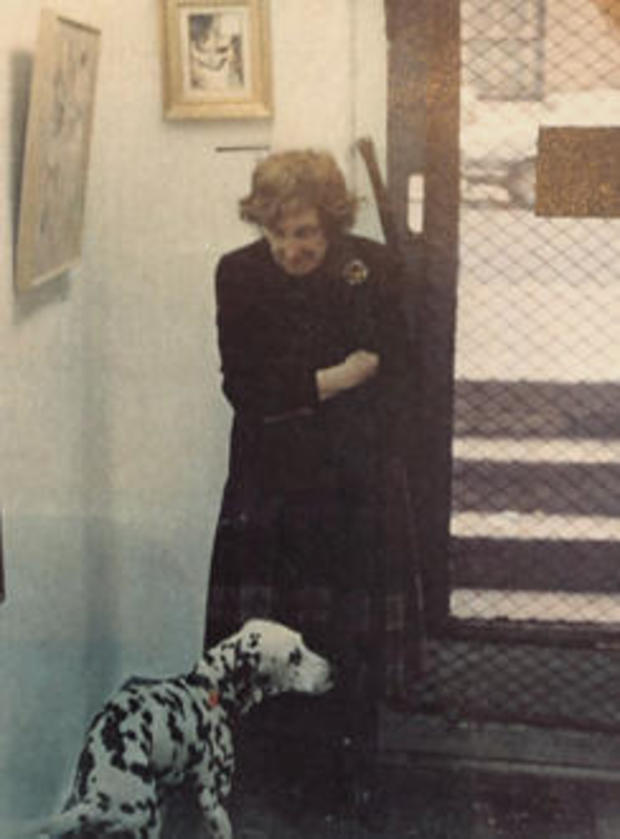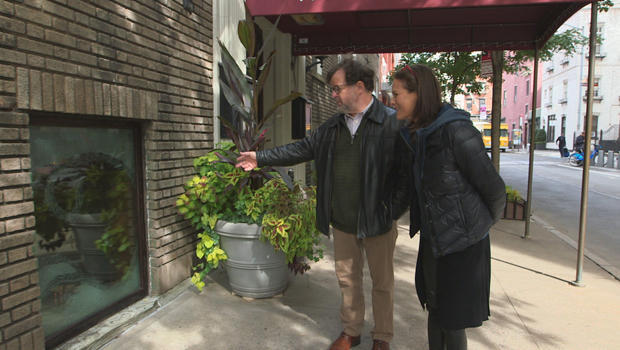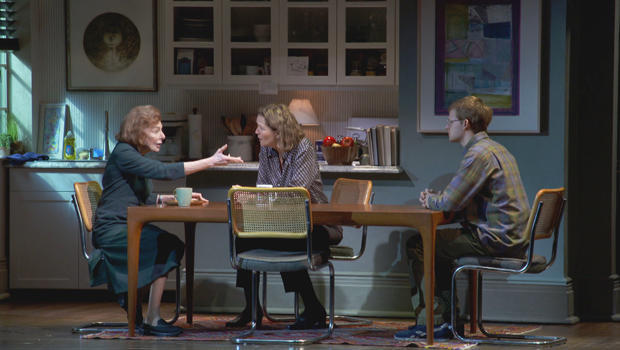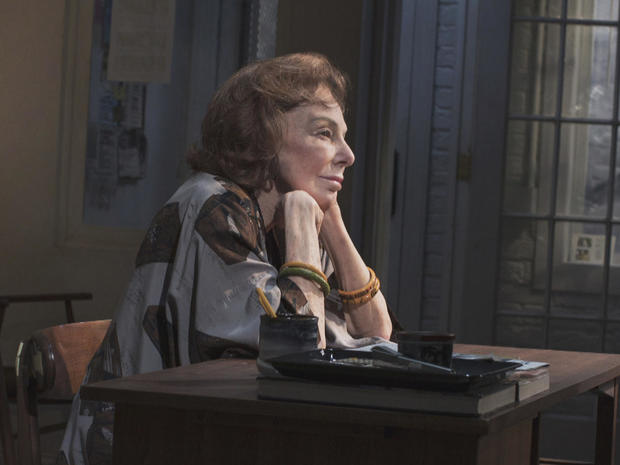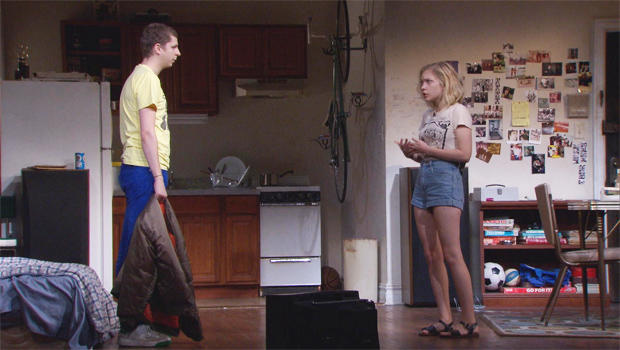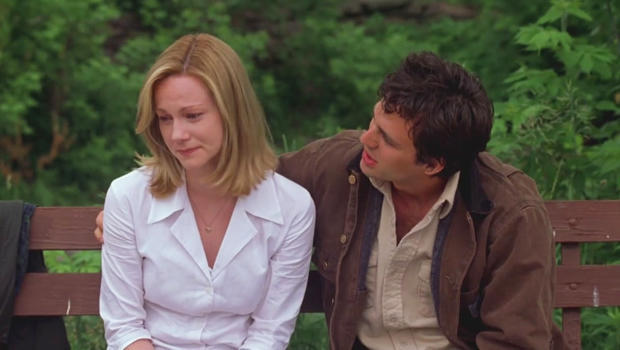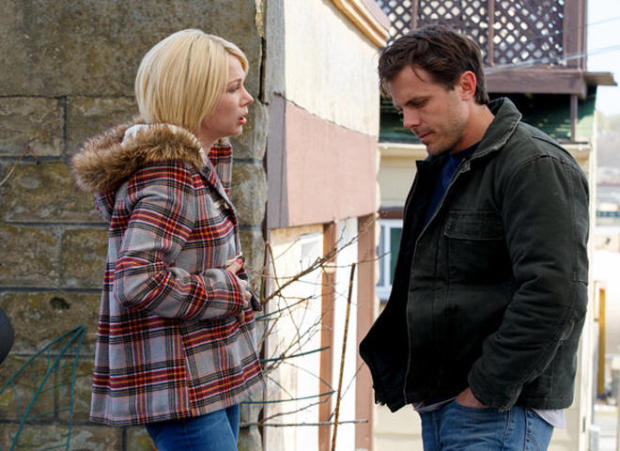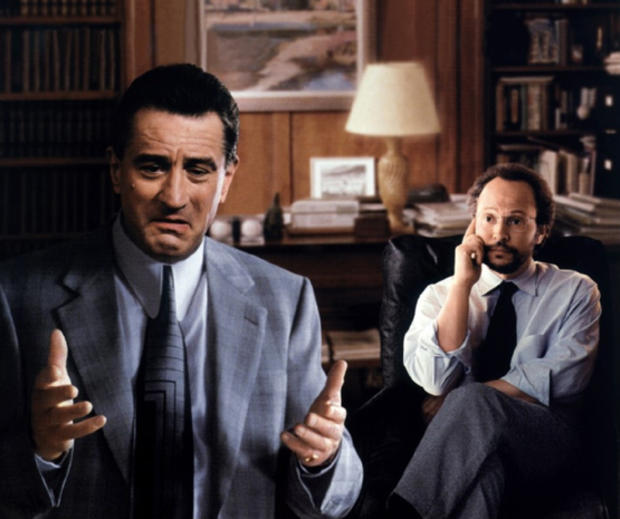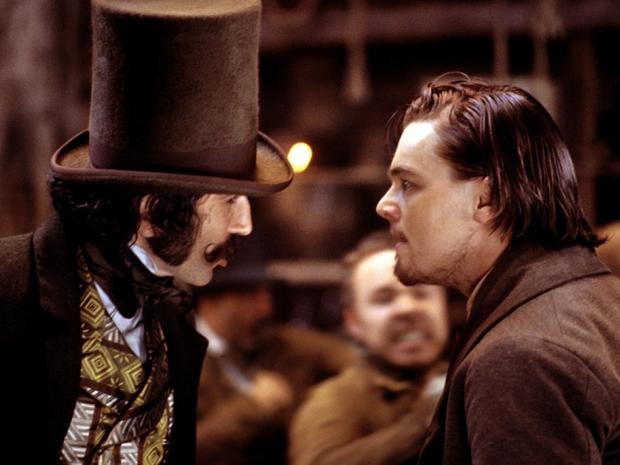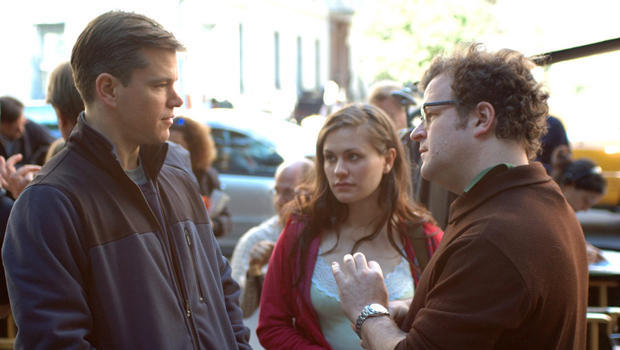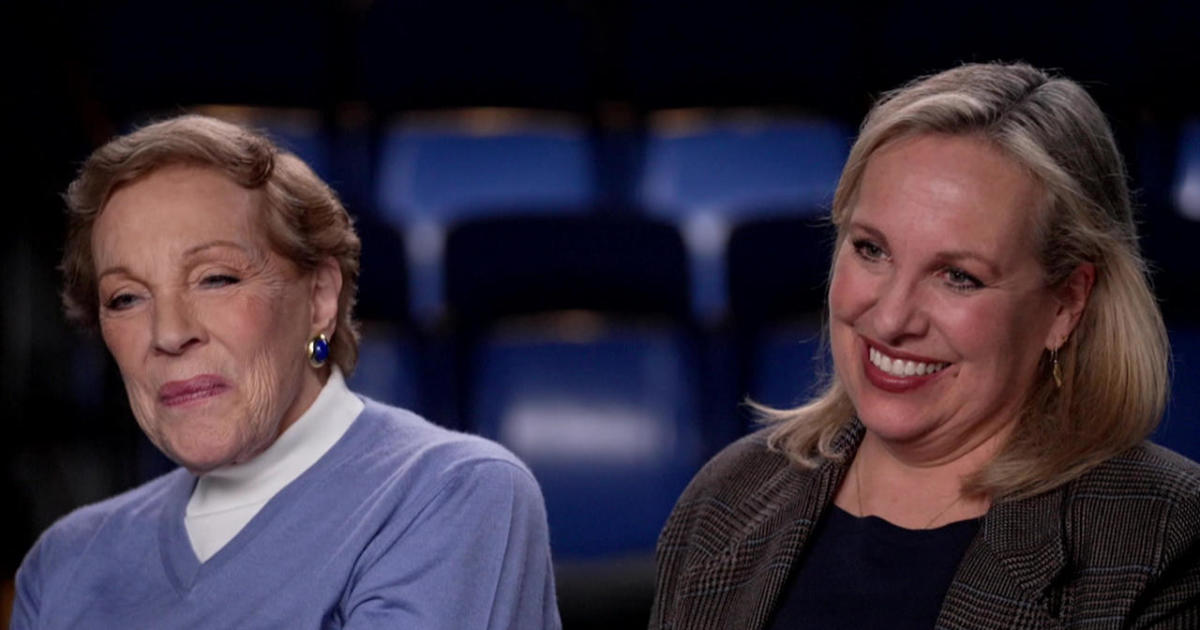Extended transcript: Kenneth Lonergan ("The Waverly Gallery") on writing for stage and screen
In this extended transcript of an interview with "Sunday Morning" correspondent Serena Altschul, the playwright and Oscar-winning screenwriter Kenneth Lonergan talks about the origin of his 2000 play "The Waverly Gallery," currently presented on Broadway in a critically-acclaimed revival starring Elaine May, as well as his experiences, positive and negative, in the world of film.
LONERGAN: "Waverly Gallery" is about the last couple functioning years in the life of a Greenwich Village gallery owner. It takes place in 1989, it's based on my grandmother and my family, and it's about her last years trying to hold onto her life and her gallery as she kind of slips away. She's got dementia, and it's about how she tries to hang on to what she's got, and how her family, her daughter and grandson and all them cope with this extremely difficult end of life.
ALTSCHUL: Is it your most autobiographical work?
LONERGAN: [As Matthew Broderick put it], it's my most literally autobiographical work. The details are all very much drawn from my experience and from my family. And all the characters are very closely modeled on my family. There's a character who's a painter who's inspired by a real guy, but his personality bears no resemblance to the real guy, who I didn't know that well. That character's somewhat invented. But it's a play. It's not a memoir. But it is a memoir play, I guess! (CHUCKLES)
ALTSCHUL: You said she was a lover of life and people, more than the art and the gallery.
LONERGAN: She lived for company and for society – I mean the society of others, not "high society." Her apartment was a social hub in the '40s, '50s and '60s. I think more the '50s. She was a big Village leftie. She was kind of a soft communist, I like to describe her. She wasn't, like, a hard-core political person, but she was always very active in politics. She was a member of the American Labor Party. She did a lot of work on housing issues. She was somehow connected in with real estate, as she always found apartments for everyone, her friends and family I mean. This was all before I was born, so I don't know all the details.
ALTSCHUL: But she was an extraordinary woman.
LONERGAN: Yeah, she was amazing. She was very, very gregarious. She really liked to talk to people and she really liked to talk. And then when she got older she became deaf and her mind started to fall away, and so it became harder for her to enjoy the main thing in life that she liked, which was to connect with people and to talk to them. She started to talk at them, and it became harder and harder for her to be engaged in the world the way she wanted to be. And also 'cause people tend to push older people aside when they start to slip away. And it's unfortunate, 'cause people kind of hasten an end that's inevitable and doesn't have to be quite as separate. People don't quite have to be as separated from the company of others as sometimes we separate them, in this culture anyway.
ALTSCHUL: And the gallery itself, there wasn't much going on there in the end.
LONERGAN: No.
ALTSCHUL: But she was going there.
LONERGAN: Yeah, she went there all the time. She doesn't do it to make money, but it's a way to spend her time. And for years it was a really functioning local, Greenwich Village gallery, which doesn't really exist anymore, I guess. The real estate wasn't sky-high in those days. She rented the gallery from the early '60s to the late '80s, right before the kind of gentrification and real estate boom really hit the Village. She leased the space from the hotel. But not for a lot of money, I don't think. And then they kicked her out. I think this happens a lot. You know, kind of the rug's pulled out from under you before you're ready, and before it needs to be. And in the play the gallery's taken away before she's really ready to get out of it, and it seems so gratuitous, 'cause she would have been gone a year later anyway. And just to hasten the inevitable by kind of taking people away from their homes and away from their lives because they become an inconvenience, is really not great.
ALTSCHUL: When did the idea kind of start saying, "I'm a play"?
LONERGAN: As I recall, a couple of years after my grandmother died, I think, or shortly afterwards. She died two years after she moved in with my mother and out of her apartment where she'd been for 30 years. I rented an apartment in the back of the building she owned. So I was there for her last two years.
ALTSCHUL: And you were caring for her, in some ways, during that time?
LONERGAN: Peripherally. I was there. She rang the bell, I could check in. My mother really took care of her, but my mother lived uptown and I was on the scene, so I was –
ALTSCHUL: So, you would have to say, "Mom, things have progressed here. We need help now"?
LONERGAN: Yeah, and I'd check in on her like that. But it wasn't, like, I was 25 or 26. I wasn't, like, a saint, spending all my time taking care of her. But I was there a lot. This really painful final experience of hers happened right in my face, basically. Just the last couple years of her functioning where, you know, it's a very slow, gradual decline. We don't even know if she had Alzheimer's or vascular dementia or what it was. Alzheimer's wasn't quite coined as the catch-all for most forms of dementia. That would come a couple of years later. But in any case, I mean people were still using the word senile, which has gone out of fashion now.
ALTSCHUL: I guess what I'm asking is, why write it?
LONERGAN: I don't know.
ALTSCHUL: I mean, it's painful to think about and talk about and to watch. Why?
LONERGAN: I think because it was painful. I was young. I hadn't had a lot of life experience. You know, had had some close friends who were older go through real difficult medical situations. My best friend's father died quite young, and I was there for a lot of that.
But I hadn't had a lot of bad life experience. I grew up pretty easy circumstances. And this was a big deal for me. Anyway, it seemed like this enormous thing that I really didn't know what to make of.
ALTSCHUL: So when you find yourself in those situations, then you say, "I'm gonna write this. I'm gonna put this on paper and then I can grapple with it better—"?
LONERGAN: I think so. You don't really choose. You do feel like the subject is something you really have to put on paper, and you don't know why all the time.
ALTSCHUL: Once you've written something and put it down on paper, does it then inhabit a separate space from your memory? Is it a kind of a separation? Or is it still all blended together?
LONERGAN: It does. It's funny, though, because it's still attached to the real events that inspire it. But it does also become a play, you know? Or a film.
And this play particularly has a real strong presence as just flat-out memories. When I watch the play, I'm watching these actors in this story and this theatricalization of it, but I think of the actual events that it mirrors just as often, which is not quite the case with my other work, which is a little bit less literally transcribed from my life. But also I was trying to do with the – it's always weird to talk about your own work.
ALTSCHUL: Thank you for indulging us!
LONERGAN: No, no. It's not that. Just you feel you do want it to stand on its own and not require your descriptions of it. But it also is sort of the idea of an attempt to do a play in some kind of documentary theatricalization, 'cause it's very literal, and the events are not written in any way as to try to compress or bend the reality to make it more like a story.
It's a funny word to use, but there's something fun for me about tryin' to put it down as if you looked into the room, that's exactly what you would see. You wouldn't see anything bigger or smaller than real life, and yet if you can tell a story with a beginning, middle and an end in that aesthetic, then that's quite interesting to try to do. And it's interesting for the actors and the director to try to make that come to life. And that's quite fun to do even if the material is painful.
ALTSCHUL: Yeah. It's difficult, I imagine.
LONERGAN: It is difficult. But it's interesting. In a funny way, your memories of something you're using directly, if you're pulling actual memories or experiences into the material, and pulling invented people and events into the material, in a funny way it's the same function. It's just you have to invent less when you're using real life. And real life is richer usually than your imagination. If you borrow a character from your life, you can borrow their entire biography. You can know a lot more about them they you might know about a character that you have invented.
Or if you combined people, it's very easy to pull details. This one person's father was a professor and his mother came from Ireland. And you know, you have this information about the person in the back of your head while you're writing the person's dialogue. And it may never appear in the material, but you have it feeding everything that they say and do.
ALTSCHUL: So the constraints of the facts kind of give you freedom to explore the little details?
LONERGAN: Well, it gives you backup. They give you backup and depth. And the more you can draw from your life, as they say, the less you have to invent.
And her personality is very vivid. And you know, I think a lot of her impressiveness is there, and her zest for being alive and involved and all of her unique qualities are on display, I suppose. And I'm sure she'd love that Elaine May was playing her. I'm sure she'd get kick outta that.
ALTSCHUL: It was 20 years ago that you were writing "The Waverly Gallery." As far as caring for elderly and people with dementia, aging people with Alzheimer's or any of these diseases, not much has changed today.
LONERGAN: Oh, I'm afraid that's true. Yeah, I'm sure that's true. I think it's just really difficult. You know, you feel like there are these options and none of them lead to a good place. It's really hard to take care of someone all day long. Even if you have the wherewithal to do it, it's almost impossible. It's very expensive to pay for someone else to do it. It's very painful to put someone you love in a hospital or a nursing home, which is essentially a hospital. Most people don't like being in those facilities. Most of those facilities aren't so great. People who are lucky who don't mind being in them and the ones that are very nice, if you can afford them, are great. Not to quote myself, but there's a moment in the play when the narrator, the grandson says, "It feels like there's some option, but you just can't figure out what it is."
And I think the main thing about it is that the person is still as alive as you are, and they can't be relegated into the status of an invalid. They wanna be involved. They wanna be alive. They don't understand that they don't understand. And they don't see themselves as someone who should be put on the shelf. And so that's who you're dealing with, and they have to be treated with that respect at the same time you have to take care of them.
ALTSCHUL: And as someone who you love, dearly, the person is still in there, even though things are scrambled.
LONERGAN: Yeah. And you kinda wanna say, "Where are you?" But then sometimes they just reach out and there they are.
ALTSCHUL: Yes.
LONERGAN: And that's when it's a bit tricky, if you're on the inside, to say, "Well, that's okay. We'll just set them up in this …. I'll visit once a week or I'll--" but often you have to do that, because there's no other practical way.
And that's the other thing that I'm interested in, anyway, is that a lot of these big situations come down to practicalities, like who can be there at 5:00? How are we gonna get her to go to the bathroom without embarrassing her? How are we gonna make sure, the person might not wanna take a shower, or they take too many, you know? Or the locks on the doors, the gas on the stove, or just arrangements of who's gonna take so-and-so to the doctor, to the eye doctor, and that becomes a big part of your life. And it's something that's kinda skipped over often times.
ALTSCHUL: Yes. And their loneliness, their isolation, their confusion, their anxiety, real and unreal. All of those things that you touch on in this are really, it's heavy. And funny, yreah.
LONERGAN: There's all these attachments. You know, it's not just awful. Like, people, their good strengths come out not in a sentimental way, but in a real inspiring way. People really work hard to help take care of their loved ones everywhere, all over the world. And really the bonds are very strong. It doesn't make it okay when things go badly, but it is something that is beautiful that's brought out when these very difficult things happen.
ALTSCHUL: Yeah, the ties within the family were beautiful in the short hand. And the moments where there's, you know, laughter or that easiness or understanding.
Why did you want to bring this back now?
LONERGAN: Well, you want your plays to have a life. You don't want them to be done once and forgotten. I would have brought it back earlier, if the circumstances had lined up. It's hard to get these productions up. And mainly you wanna get a great person in the lead role, and that's where Elaine May comes in.
ALTSCHUL: Would you have brought it back without her?
LONERGAN: I would have tried to. She was my first choice. She was all of our first – all of our-- the first choice of all of us. I'm not sure what the grammar is there! (LAUGHTER) But she's a genius, and she's incredible in the part, and I always wanted her to play this role.
ALTSCHUL: Why was she perfect for it?
LONERGAN: She's a brilliant woman. She's really funny. She's really smart. She's a great actor. Her moment to moment reality in the play is remarkable. She's incredibly insightful and she's a lotta fun. And she belongs in this world, even though she's nothing like my grandmother and the character is her invention, really. There are places where there's this uncanny resonance that's both Elaine, the character she's playing, and my grandmother. And I don't know how she does that.
ALTSCHUL: Just speakin' through her, right--?
LONERGAN: She's incredible.
ALTSCHUL: "Waverly" opened to critically great reviews. It's been a box office hit. What would your grandmother say? (LAUGHS)
LONERGAN: I don't think she'd be too happy!
ALTSCHUL: She wouldn't?
LONERGAN: No, I mean the play is about her at a age she wouldn't wanna be seen at, and a state of mind she wouldn't want anyone to be witness to.
ALTSCHUL: Right.
LONERGAN: I'm sure she'd love something that was about her in her heyday, but I don't think she would enjoy this at all. Although she'd be very happy for me. She might be able to put her personal feelings aside. (CHUCKLES)
ALTSCHUL: You mentioned that you were living next door to her. How did you say yes? "Yeah, I'm gonna live in grandma's building. I'm movin' in"?
LONERGAN: It was a great apartment! I was outta college, and was living in an apartment on Bank Street that I was subletting from my brother-in-law. And my grandmother owned this eight-unit building in the Village and this huge apartment in the back, which was $900 a month in 1986, which was a lot for me, became available, 'cause the guy who'd lived there for 17 years moved to Texas.
And my older brother was gonna move in, but then he moved to Brazil. So I got to move in. And one of my college friends was my roommate, so we split the rent. And I stayed there for 20 years, 28 years.
ALTSCHUL: Both of your parents were psychiatrists. Do you think that had an influence on your ability to bring so much understanding and depth and character analysis?
LONERGAN: I'm sure it did. I mean, who knows?
ALTSCHUL: Did you ever think you would be interested in being an analyst or a psychologist? And how the brain works and how people make the choices they make?
LONERGAN: No. Although I think it's something I would be good at and that I would like and be interested in. It seems very interesting. But I don't know if I really have the temperament for it.
My stepfather, who's still practicing, you hear him talk about his work and it's fascinating. He loves it. He's very interested in people. He's very undogmatic. He's very smart. And it just sounds like a fascinating thing to do all day long.
ALTSCHUL: They're psychotherapists or psychiatrists?
LONERGAN: They're psychoanalysts. They're Freudian psychoanalysts. Right down the line!
ALTSCHUL: Five days a week?
LONERGAN: I don't know that, nobody does that anymore. But yeah, I don't think he has any full-time analytic patients anymore.
ALTSCHUL: What about the process of writing? Who kinda guided you there?
LONERGAN: Well, you know, a bunch of people. The main person who helped me was Matthew Broderick's mother, Patsy Broderick. She was a really good friend, so I always feel funny calling her a teacher or a mentor, but she that also. She was just the smartest person I've ever met.
ALTSCHUL: Really the smartest person you've ever known?
LONERGAN: I'd say so. Yeah. As far as I'm aware. I may have met other smarter people but not spoken to them. No, she was really brilliant. She had this incredible insight. She just was very thoughtful and also very, very insightful.
ALTSCHUL: I love that she kind of got to the heart of what some of your works were about, before you knew.
LONERGAN: Oh yeah. She'd always know what you were doing. And she'd know when you weren't quite doing it the way it wanted to be done. And she just had a very profound understanding of – I hate to call it this – how the creative process works. And she also had a profound understanding of how elusive it can be. I showed her every single thing I wrote that I cared about, from the time I was in 10th or 11th grade to, I was about, well, 40 years old. And she died, so that was the end of that. But I didn't really feel like I had finished, I didn't feel safe with the material till she'd said it was okay.
ALTSCHUL: Really?
LONERGAN: Yeah. It wasn't, like, I always agreed with her. And I got to know her tastes a little bit, and I got to understand where they diverged from mine. And she was also very, very honest and blunt, without being mean, but it was very valuable, 'cause most people, you beg your friends to be truthful with you, and they tend to soft-pedal their criticisms a bit anyway, unless they're just smart asses who like to criticize you, in which case you don't need their help. (LAUGHTER) But it's nice to have someone who's supportive, but very, very truthful with you.
ALTSCHUL: You're so well known for your natural dialogue between characters, it almost feels as though we're eavesdropping on a conversation. Where did you hone that? This natural, relaxed dialogue between characters?
LONERGAN: Well, I try to recreate actual human speech as best I can. And I mean, I have a good ear for dialogue, obviously, and I have a good desultory memory for some things. I miss huge swaths of experience, but (LAUGHS) of little pieces that I remember, I remember pretty well. I've always liked dialogue. I've always been interested in the way people talk. I wrote a science fiction novel when I was 11 and 12, or 12 and 13, something like that. It was called "The Wonderful World of Pluto." (LAUGHS)
ALTSCHUL: Oh my gosh. Your parents had their hands full.
LONERGAN: No, no! I was just sitting there typing. I don't think it was too much to cope, I was. But anyway, my father read something that I had written and he said, "Your dialogue is very good." And I was so pleased that he had liked anything that I had done, that I then thought, "Oh, I'm very good at dialogue." And I don't know if I was or not, but I think that one compliment directed me, fueled me a bit and encouraged me. Who knows? I mean, nobody knows why anybody's good at anything.
ALTSCHUL: And it gives you confidence. You know? You do something, and somebody acknowledges a job well done, it gives you that extra little something.
LONERGAN: Yeah, or even if they say you're good at something you're not good at, you think, "Oh, well maybe …" It might encourage you to go in that direction a bit more.
ALTSCHUL: So, speaking of things that stood the test of time, how does "The Wonderful World of Pluto" hold up now?
LONERGAN: Not too well! The pictures are good. (LAUGHTER)
ALTSCHUL: So, "Waverly Gallery," "This Is Our Youth," pieces of yours that just stand the test of time. Years go by, you watch them again, they feel fresh, relevant. What is it? Is it that dialogue that makes a piece feel timeless?
LONERGAN: Who knows? The only thing I can say, I consciously try to avoid being topical.
ALTSCHUL: Issues of the day are not on your plate –
LONERGAN: Not really. There's nothing wrong with them, and if they have some depth to them, you know, you read plays that are topical that are 30, 40, 50 years old and they're wonderful because they have something besides topicality to them.
But I don't know whether this is grandiosity or what, or just a desire for the material to stay alive, but I try not to worry about that too much. And it's hard, it's not really for me to say. I hope the plays are good and good enough to live beyond the first couple years when they appeared.
ALTSCHUL: You know, "This Is Our Youth," it's a play, it's young people, and it's just talking. They're just all talking. Lots of talking. One might think, "Oh, well, that's, you know, kind of a simple play. They're talking." But that's actually the most complicated thing to do, is to have people simply talking.
LONERGAN: Yeah. Most plays are just talking!
ALTSCHUL: Yes, yes. (LAUGHTER)
LONERGAN: You know, you can turn the lights on and off, (LAUGHTER) if someone walks in or out. But yeah, because I'm trying to make it resemble real life as much as I can, I think some of the – people have said, "Well, nothing happens in that play, but the dialogue's very good." But I think if all that happened to you in two days, you'd think you'd had quite an eventful weekend. So I actually think a lot happens to those characters. And there's not exactly a plot in "Waverly Gallery," but there's this progression. There's a plot of some kind. There's a structure to it, or you couldn't write it. And I don't know that I feel peeved or pleased when sometimes people say, "There's no stories in my plays," 'cause I try very hard to give – you can't function without a structure. You can't just throw stuff down and have it be interesting.
ALTSCHUL: Right.
LONERGAN: You might be interested for five or ten minutes, but then the bottom drops out and you're just like, "What's gonna happen next? And I don't care."
ALTSCHUL: Right. So when people say there's no story, there are no plot line, it's no beginning, middle and end. No, they mean something else?
LONERGAN: I don't know what they mean exactly, because you know, I often find when I'm watching something, it's when they bring in the sensational event that I start to lose interest. Unless it's a sensationalist story, in which case it's great. You know, can be really good. Like a spy novel. But even those depend somewhat on their verisimilitude to be compelling. And I mostly have verisimilitude as an anchor. But with no story, it's not interesting.
"You Can Count On Me"
ALTSCHUL: Let's talk about "You Can Count On Me" and how that story developed.
LONERGAN: It was a Naked Angels theatre company one act. This is different from how I usually work, but we would do one act plays, evenings of short pieces, which would be on a single theme, but very, very broad strokes. Like, one would be censorship and the other would be faith and the other would be women. I mean that's a pretty broad – half the human race is a very broad topic! (LAUGHTER) So you can kind of write whatever you want.
So there was an evening about faith, whatever it meant to you. And I have no religious faith at all, but I'm curious about people who do. And I'm interested in people who don't think the way I do.
So, I had this idea about a brother and a sister, just started to think what it means to me. And I thought of faith in other people, faith in other people, and the idea of putting your faith in someone who may not necessarily have earned it. And then the fact when people put their faith in you, sometimes you try to live up to it. Even if initially they were making a mistake.
ALTSCHUL: Right.
LONERGAN: And that somehow got around to this brother and sister, one of whom was a religious person and the other of whom wasn't. One of 'em had kind of a restricted existence. The other is all over the place. Has a lot of freedom, but no foundation. And then I thought, "Well, this is great. I like these two characters. I love this little scene." And then I was unable to write it for eight months. I don't know why.
ALTSCHUL: So it just had to sit there. A little seed in your brain somewhere, and you just let go. Let it sit back there. And then what happens? What changes where you feel like, "Oh, I've got something – "?
LONERGAN: I have no idea. No idea. It percolates somehow. I sometimes wonder about that, 'cause there's often a delay between when you have an idea and you're able to write it.
ALTSCHUL: And you take that idea that was just a little nugget of a brother-sister, different worlds, different perspectives on meaning. And it changes into something bigger now.
LONERGAN: Yeah, so I wrote the scene. It was about 12 pages long. And I really liked it. We performed it. The two actors were just great. And it seemed to me, I really liked the characters. I thought maybe I would use them for something else someday.
And I was watching a play, it had a little kid in it. My mind was kinda wandering. And I thought, "Oh gee. What if the sister in the one act had a son, and the brother, who's a bit irresponsible, formed a relationship with him and then kind of let him down a lot?" And I thought, "Oh, that sounds like a really good story." To me, anyway.
And I immediately thought of the whole film in a way in my head, when I was watching that play. And I knew I had a good arc for a full story. And then it's often hard to describe how these things come about. In that case I kind of knew what the main relationship was, what the ending would be, and what the structure of the events was going to be. And then it was a question of filling things in. Like I thought, "Okay, so he'll let the kid down in various ways, three or four times." But I didn't know what those would be. And then other things start to happen. It's like doing a crossword puzzle. Like, you're stuck, stuck, stuck on one word, and then there's an adjacent word that you figure out and it gives you one letter to the word you don't have. And then it gives you that whole word, and the whole thing starts to come into place.
ALTSCHUL: Right. The structure builds from the inside-out.
LONERGAN: Yeah.
ALTSCHUL: So then from writing novels, plays, screenplays, you decide, "I'm gonna try directing." When does a young man decide, "I'm going to try directing now. This feels like a good choice?"
LONERGAN: When he realizes that he's being more of a backseat driver as a playwright than he ought to be.
ALTSCHUL: Not enough control.
LONERGAN: Well, or being too controlling without being in charge, because if you're gonna have a director, you have to let them direct.
ALTSCHUL: Yes.
LONERGAN: And if you wanna do everything for them, you should direct it yourself (LAUGH) or shut up. (LAUGHTER) Or at least step back a little bit.
ALTSCHUL: How did you learn that?
LONERGAN: Well, I just [had] one small theatre experience after another. And then I also noticed, not to be immodest, that I often had an idea about how the scene could be played out. I think I'm more oriented towards actors than some of the directors that I had worked with were. And I found that I was able to communicate with the actors, I thought, better than some of the directors that I'd worked with.
ALTSCHUL: So you're an actor's director?
LONERGAN: I am, I guess, because I was oriented that way from a very young age. Matthew's mom was an acting coach, and one of the things she would help me with when I was writing plays was to say, "Listen, no one can act this. This is descriptive. This would go nicely in a book, but no one would say this and no one can act it." For whatever reason that passage wasn't actable. And she was very much towards what was towards the behavior, and not so much the words.
But I also worked with some wonderful directors. But even if they were wonderful, I could feel myself kind of getting in their hair, more than was appropriate. And I thought, the other thing is that I still don't feel the need to direct theatre all the time. I have two plays that I directed 'cause I had a real specific idea of how I wanted them to be, the whole design. But my other play, "The Waverly Gallery," had this great director, Lila Neugebauer. And I'm able to participate without taking over. And it works fine. For a movie, if you're not gonna direct it you might as well say goodbye to the material forever, if you're the writer.
ALTSCHUL: Do you feel that way about screenplays now? If you're not directing it, you just say goodbye to whatever vision you had?
LONERGAN: Yeah. That's just--
ALTSCHUL: And just walk in the other direction--
LONERGAN: But that's the system. I mean there's two parts. One part is that that's the convention for screenplays in this country. The other is that when you do direct you can kinda see why you might not want the writer hanging around, because there's so much you have to do that is not to do with the script. That you have to have some flexibility with what you do with the script. On the other hand, if the convention was to be more respectful of the screenplay, everyone would work around that just fine.
"Manchester by the Sea"
ALTSCHUL: Can you talk about "Manchester by the Sea"?
LONERGAN: That was unusual, 'cause that was an assignment at first, that became my own project. Because Matt Damon and John Krazinski came to me with the idea for the story.
ALTSCHUL: So they come with a story idea, and say, "Here are the characters. We're kinda thinking this is the story." They don't come with material presented. They say "We really want you to write this"?
LONERGAN: Yeah, they had an idea for a movie that they liked. And then they liked my writing, so they wanted me to write it. And Matt was gonna direct it and he was also gonna be in it. And then eventually he wasn't. When he read the script he suggested that I direct it. And then as it turned out, he wasn't able to be in it either because of his schedule. 'Cause he's always working. They had, like six projects backed up and there was a teeny window which closed. So that's how that came about. And it was unusual because it wasn't an assignment and I didn't generate the material, but very quickly everything in the film became, it did generate after a short time, 'cause I wasn't able to write the script any other way.
ALTSCHUL: And you cast Casey.
LONERGAN: Yeah. And we ended up casting Casey. We went right to Casey after Matt became unavailable.
ALTSCHUL: Actually, great choice.
LONERGAN: He is amazing.
ALTSCHUL: Just getting those kinds of performances out of actors, it only happens when you've got somebody who is an actor's director who understands what it's like on both sides.
LONERGAN: Well, they bring so much to it. And without that, you don't really have much of anything. I mean, there are some directors, great directors, who aren't particularly oriented towards the acting. And they kind of let the actors do what they're gonna do. And if you get good actors, that's great.
ALTSCHUL: But when you do it, you're allowing actors to take the chances and the risks.
LONERGAN: Oh, you have to. Well, I mean most of it's casting. If you cast the right person, and the more you direct, the more you learn that it's casting. Well, I knew that from the beginning, but the more you learn to get out of their way and shut up. (LAUGHS) 'Cause they don't really need you telling them everything all the time. They come in quite a lot, and they have a big job to do. And if they're anywhere near www you want them to do, it's really a good idea not to say too much. And it's really hard to learn that, because you're, like, full of ideas of your own.
ALTSCHUL: Right. So does that come with time? Wisdom? Mistakes?
LONERGAN: Mistakes. Like, you notice that after you talk they get worse. (LAUGHS) So then it's very simple to understand that you shouldn't talk!
ALTSCHUL: So "Manchester by the Sea" was profoundly sad, disturbing, moving, emotional, let's just say very, very sad.
LONERGAN: Yeah.
ALTSCHUL: But the film didn't scare people away. I mean, that kind of topic and the sadness, the grief, the loss. That could have just been something people just retreated from, but it didn't. What was it that resonated with people in that? Why were the audiences drawn to that film?
LONERGAN: Well, it's always hard to say, but I think it's not a punishing movie. It's not a movie that's tryin' to beat you over the head. It's not tryin' to make you miserable and it's not tryin' to shove your face into misery. It tries to be a human story about people going through something very difficult and doing their best. And that's something interesting, there's a natural dramatic content in there.
ALTSCHUL: Right.
LONERGAN: And it makes it a story and not just a dirge. If it was dirge it would be terrible. And not something false about it. I feel like there's a falseness to the shrill nature of some comedies. And there's an opposite falseness on the other end of the scale to when things are just too heavy, too miserable, too relentless, too bleak. Even though life can often be extremely difficult, there's always other things happening, so there's a feeling there's a false manipulative feeling to me when you forget to mention that the person at the other table is having a great time while you're being broken up with by your girlfriend or worse.
We're not all having the same experience all the time. Or you know, it doesn't rain when you're in a bad mood. You're in a terrible mood, you go outside and it's a beautiful day. Or you're in a great mood and it's a rainy day. And I think keeping all those balls in the air keeps it from being a depressing experience.
"Analyze This"
ALTSCHUL: So let's go back a little bit in time, kinda early on. You had early success in the film business. "Analyze This." You know, how did that come about?
LONERGAN: "Analyze This" was an original script that I wrote. I never wanted to be a screenwriter or a director, or I didn't at first. I wanted to be a playwright, but you can't make any money as a playwright unless you're a very big deal.
And I had friends who were making good money writing screenplays, and they kept urging me to do the same. And my stepfather gave me the idea for "Analyze This," 'cause it was based on a real anecdote where a famous Mafioso went to one of his colleagues – the only Sicilian psychoanalyst in New York at the time, (LAUGHS) who had been approached by a famous mobster who wanted to talk to him. And he saw him once and said, "Just don't tell me anything. I don't wanna know anything about you or your life or anything." 'Cause he didn't wanna get involved.
ALTSCHUL: No. (LAUGHS)
LONERGAN: I thought it would be funny if he took him on and all sorts of terrible things happened afterwards! (LAUGHTER) It was a bit too high concept for me. But the idea was to write a script and sell it, and let them do to it whatever they were gonna do to it, but make some money. Which is how it turned out. And then they ended up making the film a few years later.
ALTSCHUL: What was your experience with that process?
LONERGAN: I sold the script. I got a lotta money for it. I did two rewrites, studio rewrites, which were terrible. (LAUGHS) Terrible ideas, terribly executed by me. And then they bought the script outright, which is unusual.
ALTSCHUL: So the two rewrites were scrapped and –
ALTSCHUL: You go to the original. So I lived off of that script. My overhead was very low. I lived off that one script for three years. And I was able to write plays and do what I wanted for three years. And it gave me an entry into the screenwriting world, and I rewrote other people's scripts.
"Gangs of New York"
ALTSCHUL: So Martin Scorsese says to you, "I need your help. Could you maybe add some depth to the characters." What does that mean, add some depth to the characters and the script?
LONERGAN: Oh, it just means make them better.
ALTSCHUL: So you take the script and there are specific characters that he gives you an assignment? Or this six characters? Or two? And I want you to really bring them to life more. Make them more approachable?
LONERGAN: You know, they were having structural problems with the script. Mostly they were having problems with Leonardo DiCaprio's character. They tried a bunch of different ideas for him. Tried him being a cold blooded killer. And so they basically come to you with their problems, and then also say, "And if you have other problems with the script, you know, let us know what you think, and maybe we should address those, too."
ALTSCHUL: So it's a draft?
LONERGAN: They're very far along in that process. I was asked to come on two weeks before they were supposed to start shooting.
ALTSCHUL: Holy – wow!
LONERGAN: Yeah. So they actually delayed shooting for a couple of weeks because they needed to work on the script. I read the script. It was pretty clear where it was working and where it wasn't. Most of the stuff with Daniel Day-Lewis' character was really good, so I barely touched that. Leo's character was sort of all over the place.
And so you just kinda get in there and you just try to – same as with your own work, you try to think of a person who feels vivid to you. You try to put that person into scenes. A lotta the dialogue I thought needed work, so I tried to make the dialogue scenes better. I tried to beef up Cameron Diaz's character as much as I could. You never know what to do until you're faced with a problem, then it's quite obvious what you wanna try to do, anyway. And it was really exciting.
ALTSCHUL: Do you love being given a problem?
LONERGAN: Yes.
ALTSCHUL: Do you like to fix stuff?
LONERGAN: I do, yeah. And I do like that. It can be really fun. And it's nice to come in and save the day. That movie was so late in the process that every other movie I've ever script doctored, they always rewrite you after you're done anyway. It's more like an exercise than a real creative endeavor. But you're not there to express yourself. You're there to help them out. So it's easy to walk away from.
ALTSCHUL: Triage.
LONERGAN: Yeah, and it's not your movie. You're there to consult and help. And it can be really fun to try to do that.
"Margaret"
ALTSCHUL: So "Margaret" is perhaps your least-seen movie, but also considered your master work.
LONERGAN: Yeah, I think it's the best one I've done of the three [I directed]. I like all three of them, but I think that's the most interesting.
ALTSCHUL: Was that story drawn from something in your life? Do you know those characters?
LONERGAN: Just a little, well, a lot of the material. It also takes place on the Upper West Side, where I grew up. The high school that the girl goes to is based on my high school very closely.
ALTSCHUL: Walden?
LONERGAN: Yeah. Very closely. And a lotta those conversations in the classroom were taken strictly out of our [classes]. Yeah, smart (LAUGH) and smart-alecky [kids]! Everything you write is culled from your own experience or the experience of people you meet or see in other films or plays, and it's translated. Just a lot of borrowing and drawing on from all sorts of places.
ALTSCHUL: And at its core, what is it about?
LONERGAN: That's a little hard to say. If I could say in a sentence, I wouldn't be taking up three hours of anyone's time. (LAUGHS)
ALTSCHUL: Well, there was a lot of beautiful things in that film to look at.
LONERGAN: It's a little hard to say what it's about. It's about a teenage girl who's facing what the real world is like for the first time. And it's a very big world. And everyone else in it is just as interested in their life as she is in her own.
ALTSCHUL: Yes.
LONERGAN: And that's probably why it's so hard to get anything done. (CHUCKLES) Or get anything right in life, 'cause everyone else is pursuing their own agenda, with perfect reason. Why shouldn't they?
ALTSCHUL: I mean that's what it is about, right? It's just about coming to terms as a young person realizing that everybody's really doing their own thing. And you may feel like you're at the center of something important, and that is true, in your own world.
LONERGAN: Yeah. So is everybody else.
ALTSCHUL: But in the grand scheme of things it's hard to wake up. Yeah.
LONERGAN: Yeah, it is hard. And especially as you're becoming an adult, and becoming not just a function of your family and your parents, to be facing the complexity of the rest of the world, and the fact that other people are just as important as you are at that moment when your own ego is identifying itself, is a very tricky moment in life. And it's something that some people never come to terms with.
ALTSCHUL: Why was that film a hard film to make in the end? Why were there so many troubles, if you read about it or you read some of the, you know, the lawsuit. What happened? Where did it go wrong?
LONERGAN: It's a long story. The short version is that they didn't trust me to take care of the film after it was shot, in the editing, and I didn't have the smarts to put them at ease. And it just escalated. And none of us would budge. And it just went on and on and on.
ALTSCHUL: So if you were to do something differently, you might have said, "Okay, guys." You mighta walked them through it a little more?
LONERGAN: I woulda walked them through it more. I would have had more respect for their anxieties, even though I don't think I could have had more respect for their opinions about the film, 'cause they weren't very interesting or original or anything. But on the other hand, that's not what they're there for. That's what I'm there for.
They're there to support and pay for the film, and they're very anxious about how it's gonna turn out. And I think I just – I would be a little more – I would spend more time assuaging them and less time tryin' to convince them to get off my back.
ALTSCHUL: And that's just life experience, right?
LONERGAN: Yeah, yeah.
ALTSCHUL: Chalk it up to –
LONERGAN: Unfortunately. I wish I had had that realization before I went into it. But it worked out in the end.
ALTSCHUL: Well, it worked out in the end in that if one wants to see your version of the film, you're a click away.
LONERGAN: Yeah. Just watch the extended "Margaret," the extended edition.
ALTSCHUL: And that was what you wanted to make.
LONERGAN: More or less. It was a long way getting to the film that I wanted to make in the editing, so by the time I got there I wasn't able to completely execute everything I wanted to. But it's closer. So there's a theatrical version and the extended edition. And I really don't care for the theatrical version in retrospect, and the extended edition is more representative of the film I wanted to make.
ALTSCHUL: Earlier you said first and foremost, you are a playwright. That is what you want to do most of all.
LONERGAN: Yeah.
ALTSCHUL: Still?
LONERGAN: Yeah. Well, now that I've directed these three films, I really do think of myself as a director, as a filmmaker also. I think that's come up to occupy equal space in my mind.
ALTSCHUL: It does?
LONERGAN: Yeah. I like it. It's not like having a real job, but it's very difficult and absorbing and interesting. And as much so as being a playwright, I'd say. I'd say it's much more work in a funny way, 'cause as a playwright you can do the writing and pass it on to others, and hang around nervously to see if it turns out the way you wanted it to.
ALTSCHUL: Right.
LONERGAN: Director really has to, you can't do anything else for at least a year. It's quite a full-time job all the time.
ALTSCHUL: Are you working on any plays, films?
LONERGAN: I'm trying to work, yes. (LAUGHTER) I have a play I wanna write. I have a film I'm trying to write. And I'm supposed to write a television show, too, but I don't know what that's gonna be.
For more info:
- "The Waverly Gallery" at the Golden Theatre, New York City (through January 27, 2019) | Ticket info
